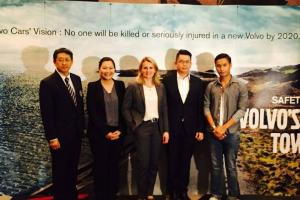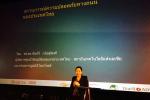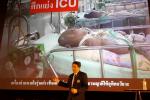Thailand Accident Research Center
ศูนย์วิจัยอุบัติเหตุแห่งประเทศไทย
TARC as an invited speaker in Volvo Safety Seminar: Volvo’s Road towards 2020
A Volvo safety expert from Sweden, together with Thai road accident specialists, shared their expertise and insights on the future of road safety during the “Safety Seminar: Volvo’s Road towards 2020”, held recently in Bangkok. The Swedish carmaker presented its commitment to make the world a safer place through the Volvo Safety Vision 2020 and underscored its continuing efforts to develop innovative technology that will eventually lead to zero deaths and serious injuries in a new Volvo car.
“Cars are driven by people. The guiding principle behind everything we make at Volvo, therefore, is – and must remain – safety”.
Every word still holds true, since these famous lines were pronounced by Assar Gabrielsson & Gustaf Larson, the founders of Volvo eighty-eight years ago. In those early days, the Swedish carmaker already highlighted the importance of safety – for drivers, passengers and everyone on the road. Today the Volvo Car Group is regarded as the role model for traffic safety, with products that ensure comprehensive protection and a commitment that will last until their goals are achieved.
Volvo Safety Vision 2020 is an ambitious project that Volvo has set its sights upon, to help create a safer world. The overall goal is to design cars that do not crash, therefore resulting in zero deaths or serious injuries in a new Volvo car by the year 2020.
The process may be challenging, but steps are incessantly being taken in all parts of the world. By using knowledge from real traffic situations in all research efforts including driver behavior, Volvo has learned how to design cars that offer a very high level of safety in collisions. In addition, Volvo offers various types of Safety and Driver’s Assist Features to prevent accidents from happening and minimizing the injuries and damages in unavoidable situations.
Dr. Lotta Jakobsson, Senior Technical Leader, Injury Prevention from the Volvo Cars Safety Centre in Sweden, presented an interesting history of Volvo Safety Technology, Volvo’s World Firsts and their evolution. She reminded the audience that the most important safety feature is Volvo’s 3-point seat belt which has helped save millions of lives worldwide. She also introduced the new terms, “IntelliSafe” which is now the umbrella name for several Volvo innovations such as the Park Assist Pilot where parallel parking is “done” for the driver; “City Safety” involving Adaptive Cruise Control adapted for slow moving city traffic, Forward Collision Warning that can pre-charge the brakes for a quick stop, Cyclists and Pedestrians Detection and the “Lane Keeping Aid” which ensures the driver stays alert.
For Volvo cars in Thailand, the safety experience will go up another notch, with the launch of the All New XC90 next year. The new model will be fitted with state-of-the-art safety belts that will include height adjustability and load limiting, even in the second row, to “optimize safety and comfort”. Also making a difference will be evolutions in the systems for rear-end collision and run off road safety. To avoid side impact accidents, Volvo added a revolutionary automatic braking system when a Volvo vehicle turns in front of an on-coming car at an intersection.
Dr. Jakobsson said, “Everything Volvo does is aimed to design cars that do not crash. With this new vision, Volvo Cars challenges not only itself but also the automotive industry and governments, since a collision-free future cannot be obtained by Volvo alone. Traffic safety has three main stakeholders: the car manufacturers, the drivers and the relevant authorities.”
Promoting Road Safety Awareness in Thailand
Thailand is a country known for the high number of vehicular accidents that result in more than 20,000 fatalities a year. Since its earliest days, Volvo’s focus has been on road safety. Back in 2003, Volvo supported the establishment of the Thailand Accident Research Center (TARC) by signing a 3-year MOU with the Thai Government in transferring key know-how from the Volvo Cars Safety Centre to Thailand. The aim of the Centre is to provide Thai officials with scientific information about road crashes so legislation and campaigns could be formed to improve the situation more effectively. The recent Safety Seminar in Bangkok was held to raise public awareness once again about car safety and road accidents.
At the seminar were Assoc. Prof. Dr. Kunnawee Kanitpong, Director of the Thailand Accident Research Center (TARC) and Dr. Anuchar Sethasathien, Secretary-General of the National Institute for Emergency Medicine.
Dr. Kunnawee delivered an eye-opening presentation on the situation and shared the results of studies conducted by TARC. He then enumerated the most common causes of road accidents in Thailand :
- Overspeeding cars, pick-ups and vans
- Non-use of seatbelts for cars and helmets for motorcyclists
- Collision with objects on the road (such as electric poles, trees, mileage markers)
In her opinion, if we are able to manage these causes, Thailand may be able to significantly decrease the number of accidents. She also pointed out that the overturning of vehicles, frequently seen on the highways, results in many deaths and injuries. She believes that through stricter measures and increased educational initiatives, the number of accidents during the festive seasons has been on a steady decline over the past decade.
The third guest speaker, Dr. Anuchar Sethasathien, Secretary-General of the National Institute for Emergency Medicine, offered a look at accidents, injuries and the impact on human life.
Dr. Anuchar said, “At the National Institute for Emergency Medicine, we are faced on a daily basis with horrible situations and tragedies causing people to lose their lives. Road accidents definitely remains a major cause of serious injury and fatality in the country.”
Statistics show that every day, approximately 50 Thais leave home unaware that they will NOT go back to their families. For those who commute by bus, coach or van, their lives are endangered by worn-out brake pads and sleepy drivers. Overspeeding through a small town can result in the death of small, innocent children. One out of three accident victims sent to Emergency Rooms are drunk, while a large number of ICU beds at hospitals is occupied by road accident victims, thus depriving other patients with serious diseases of bed space. “Sadly, we lose around 20 rescue members, who dedicate their lives save others, to road accidents each year, while our ambulances and paramedic vehicles are hit 60 times per year on average. People left handicapped lose their chance for a good career and a normal life, and have to rely on family members to take care of them.”
“The situation we are in is very serious. We need the staunch support of stakeholders of road safety, such as car makers, road builders, lawmakers, politicians, academia and everyone who uses the road. Everyone must do their fair share to improve the situation,” concluded Dr. Anuchar.
The seminar confirmed to all participants that Volvo does not compromise when it comes to safety, for the driver, the passengers and others on the road. With all the innovations being added to make the driving experience totally safe and comfortable, Volvo is certainly on the right path to attaining its ambitious goal of creating cars do not crash, and having no deaths nor serious injuries in new Volvo cars. Vision 2020 is definitely in sight – with real life in focus.










